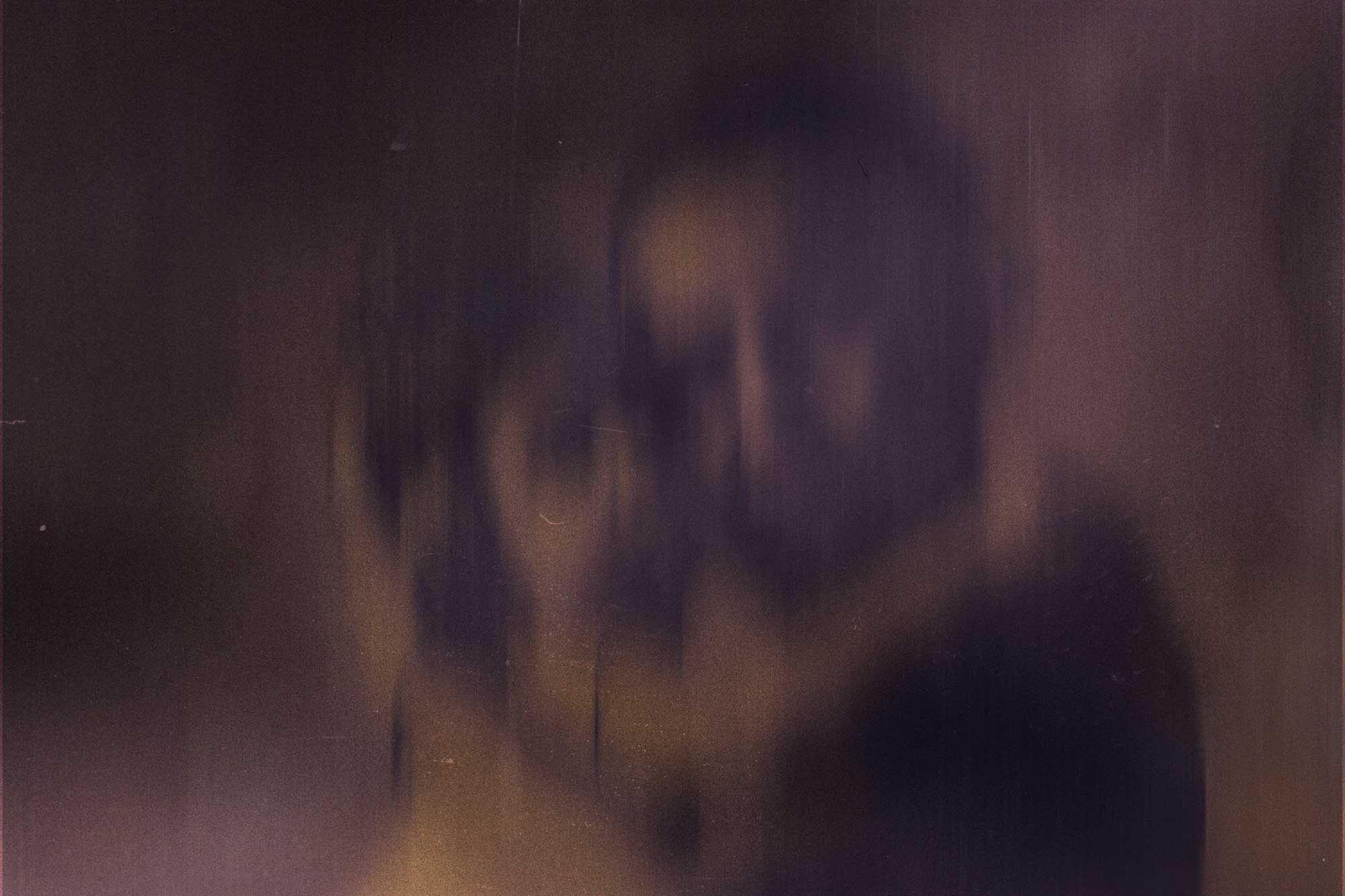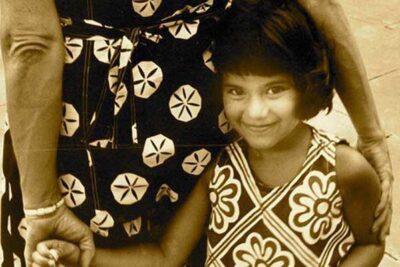A Sea of Mothers
by Ann Augustine

A few years ago, when I was going through a terrible separation that ended in divorce, I had a dream. I was deep in the ocean when I saw myself as a baby. A panic rose, and I reached out to save the baby, but she said, “I’m fine.” I woke with an unexpected sense of peacefulness at my core, aware of this basic trust in life and a deep knowing that love exists.
Now, this might make sense had I had a different early life, perhaps a secure base with little tumult or loss. But that was not my beginning. In fact, before the age of one, I’d already had at least three mothers —maybe more, depending on how you define the role.
My first mother was Carol, who carried me to birth. Carol had become pregnant after a brief affair with my father, a postdoc student from India. The relationship ended shortly after he learned of my existence. When I met Carol in my late twenties, she told me the story of becoming pregnant at twenty-three, hiding the pregnancy under big flowing dresses, and giving birth to me alone in her room after class one day. She said that when her mother came home, she commented that Carol didn’t look well. Still trying to hide me, Carol replied, “I think I have the flu.” A moment later, the lie was blown with a cry from the other room.
Perhaps Carol had not considered the consequences of getting pregnant, let alone the implications of having a brown child, but her decisions came to dominate my early fate. I was born in 1966 in North Carolina, a year before the miscegenation laws banning interracial marriage were overturned. Not only were interracial relationships illegal, but they were socially unacceptable to many, including my maternal grandmother, who upon seeing me said I was “too dark” and brought me to the hospital that same day.
I imagine myself as an infant alone in that hospital. I can almost feel the care of the many strangers who attended me during those early days—the nurses who fed me, the doctors who made sure I was healthy despite having had no prenatal care, and the others who might have held and soothed me as I cried.
Then, at three days old, I was placed with another mother, a foster parent who cared for me for the next ten months. The first time I remember hearing her name, I was twenty-four years old. My adoptive mother (more on her later) was telling me the story of coming to get me. We were on the plane to my new home when I started screaming what was likely one of the few words I knew, “Nona, Nona.” Even now, recalling her name, my eyes tear up… Without any actual memories of her, not even a faint recollection of her face, her smell, her voice, I feel Nona loved me.
I later learned that Nona had wanted to adopt me but was “too old.” She was fifty-one, younger than I am now. I also learned that as I neared the second half of my first year, I was blessed by another mother of sorts, my state-appointed social worker. Racism and the adoption practices of the time, including efforts to race-match, had made finding a home for me difficult. Perhaps concerned that I would end up lost in the system, knowing that it gets harder to be adopted as children age, my social worker had found a placement for me through the Pearl Buck Adoption Agency in Pittsburgh, PA. Pearl Buck was herself an adoptive parent and a persistent advocate for special needs, transracial, and international adoptees.
So, at almost eleven months, I met my adoptive mother, Betsy. To her, I give the title “mom” because she raised and cared for me throughout my life. Mom was insecure about being a mother.
Perhaps this was because, like me, she’d lost hers so early. When she was four years old, her mother was killed by a drunk driver. Mom and her siblings were raised by a nanny and then a stepmother, when her father remarried. Once, when I was about ten or eleven, she told me she worried she wasn’t good enough, that somewhere there might be someone better. Despite her insecurities, my mom loved me fiercely. Endlessly supportive of my creativity, explorations, and adventures, she cheered me on throughout my many trials and tribulations, and, above all, she stayed. Right until she died a few months ago, I never once doubted that she would be there if she could. For someone with my past, there are no words to describe what this means.
—
Looking back, I see that my life has always spiraled around mothers and mothering—what it means to have a mother, to lose a mother, to be mothered, to mother. As a new social work graduate, I found myself working as a child and family therapist in a local community clinic. There I saw mothering front and center as I watched the powerful interplay between secure attachment, trauma, loss, and neglect.
I remember the first time I heard a mother say she wished she could send her daughter away and the feelings of working with another mother who did just that. I remember watching the many mothers who desperately fought to get their children back from social services and the ones who never did. And I myself became a mother just a year after entering the field. Like all the mothers I’d ever known, I, too, struggled: loving, trying to love, failing in unique and universal ways, and rising to love again.
In those early years, I hid that I had been adopted, let alone in foster care, afraid of facing the criticisms I heard so readily doled out by colleagues and providers about others who had shared my fate. Recalling all this, I feel a mix of gratitude and anger. While I’m grateful that our field unearthed the impact of this type of trauma and loss on a young child, I feel frustrated with what seems like a lopsided understanding, creating unnecessary shame for people like me. It’s not that I don’t see the pain—I do. For me, losing Nona, and all the other losses, rests inside, tender yet mostly hidden except for when they appear in both predictable and sometimes startling ways. Yet as I look at pictures of myself as a child, I think, This is not the look of a child who is broken.
It may be that my security comes not simply from a “good enough” mother, as Winnicott theorizes, but from “good enough” mothering—a multitude of mothers who created a collage of mothering and a patchwork of sufficient “reliable holding” for me to draw on. I also wonder whether there is a different kind of security that grows in the gaps of not having a mother—that some of my security comes not in spite of, but perhaps because of, these early losses. As I look back, I know that in the free-falling, I grew a sense of being carried—not by any one person, but by life itself.
It feels important to mention that I am well aware that my fate could have been drastically different—as it is for so many. This awareness was compounded by hearing the frequent comments to my mother about how wonderful it was that she took me in, as though she’d saved me. She always said that I was the gift. Despite her protest, for years my work was fueled by a feeling that I owed a debt I could never repay.
Recently, something has shifted, and I feel as though the debt has been paid. I’m not sure what changed. Though the burden has lifted, the gifts of mothering remain. Beyond formal bonds, I still feel the ways I mother and am mothered each day at work, at home, and in simple daily exchanges. And I find myself afloat in a sea of mothers with all the complexity that this implies.

- Ann T. Augustine, LICSW, MSW, MPP, has been a practicing psychotherapist for more than twenty-five years. She is a graduate of Smith College School for Social Work, where she has taught both policy and practice courses. Ann specializes in the treatment of trauma and loss in her private practice and clinical supervision. Additionally, she works as an organizational consultant with a focus on nonprofit DEIA work. For more information, please see annaugustinelicsw.com.
- Email: annaugustinelicsw@gmail.com
ROOM is entirely dependent upon reader support. Please consider helping ROOM today with a tax-deductible donation. Any amount is deeply appreciated. |





